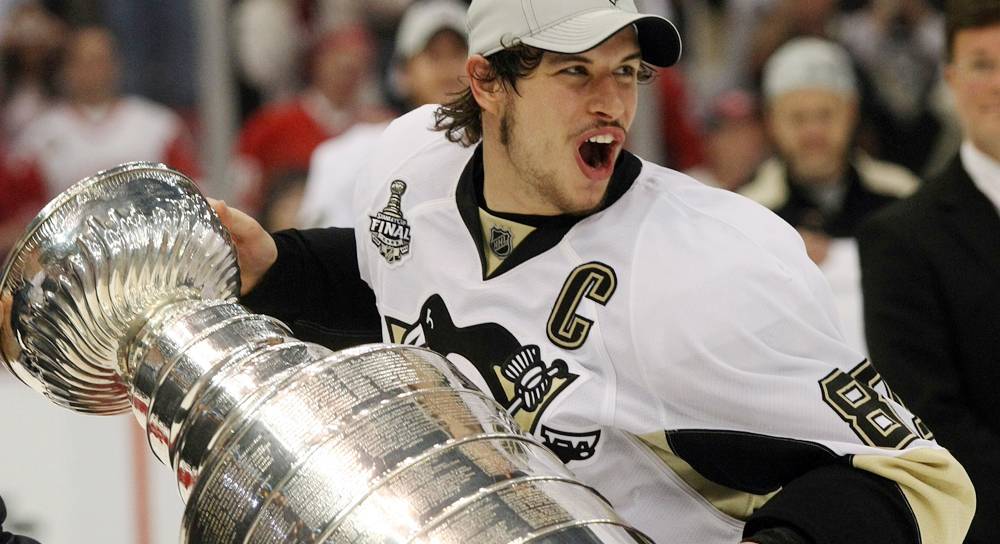The first time I heard the name Sidney Crosby, I was a senior in high school. I was at practice for my Junior Flyers team, the week before we headed up north to play a tournament against many of the top Tier 1 teams in the country, including Crosby’s Shattuck St. Mary’s. At that time (’02-’03) Crosby was 15 years old and thought of as the top midget-aged player in North America. No pressure.
In the seven years following that tournament, Crosby has revived a dying NHL organization (Pittsburgh Penguins), been named Team Captain of now one of the top teams in the world, led his team to two Stanley Cup Finals, winning the second, and most recently scored the overtime Gold Medal winning goal in the 2010 Winter Olympics for Canada. This is on top of a LONG list of other personal and team accomplishments on his road to the NHL (read more here: Sidney Crosby). At the age of 23, Crosby has accomplished more than 99% of professional hockey players ever will. And after I gave my Fantasy Hockey Team a pep talk a few games into the year, Crosby has been on fire this season as well.
Admittedly, I wasn’t always the biggest Crosby fan. When he first joined the NHL, he struck me as a little “soft”. Being a bit more objective, maybe that behavior is a little more understandable given how young he was. After all, you wouldn’t throw an exceptionally talented peewee into a midget game and expect him to be at the same physical and mental maturity level as the other players.
Now, I’m a huge Crosby supporter. There is no denying what he’s done for hockey. With the help of a few timely rule changes and an exciting supporting cast (Ovehckin, Datsyuk, etc.), Crosby has helped drastically improve hockey’s popularity across the U.S. Who knows, a few more months and hockey may overtake Nascar in the sports popularity ranks! On top of that, I’ve had the opportunity to learn a bit more about Crosby’s character over the last year, leading me to have a deeper respect for what he’s been able to accomplish. He’s not a superstar by accident.

The correlation between hockey playing ability and beard growing ability isn’t well established.
From talking to people that have worked with and around Crosby, I’ve heard one thing consistently:
“He is always trying to get better.”
If he was a Tier II youth player trying to make the jump to Tier I, you’d expect that. If he was a college player trying to catch the eye of pro scouts, you’d expect that. Even if he was an AHL player or mediocre NHL player that wanted to make a more consistent contribution, you may expect that. Crosby is none of those. An argument could be made that he is the best player in the world, yet he still strives to be better.
I’ve been around hockey for the last 18 years and there is one thing that limits player and team development as much as, if not more than anything else: Contentedness.
I think every player should have the experience of being one of the “go-to” players on their team. It builds confidence to be a leader in some way. Likewise, I think every player should have the experience of being on a team that has a legitimate chance of winning a championship of some sorts. With that said, these successes should never justify cockiness, arrogance, or contentedness.
If a player is SERIOUS about competing at the next level, they need to consistently work to improve their game. This includes off-ice training (check out this article on Crosby and his Strength Coach Andy O’Brien: Trainer’s innovative regimen key to Crosby’s game), power skating, puck handling, studying game film, and watching games at the nextl level to prepare mentally for what is to come. The name of the game is always potential fulfillment. Everyone’s potential is different, but every player deserves to feel the success and accomplishment associated with fulfilling it. There is no certainty that past successes will lead to future ones. Everyone that has been around hockey for an appreciable amount of time has seen standouts at one level flounder at the next, or, contrarily, mediocre players at one level flourish at the next. Often times, it’s preparation time that explains this discrepancy.
Sidney Crosby may be the best hockey player in the world, yet he meticulously analyzes his game for areas to improve and tirelessly works to make these improvements. This characteristic is both admirable and inspirational, and represents a humility that every player should adopt. Things don’t always go according to plan:
…Wait for it…
But the best way to guarantee your own success is to never stop working toward improving yourself as a player and as a teammate.
To your continued success,
Kevin Neeld
P.S. You can now get access to my entire Hockey Development Coaching Program at an EXTREME discount. Go to Hockey Development to take advantage of this offer today!
Click the image below to discover how you can benefit from over 150 years of collective hockey development experience from 14 of the world’s top experts!